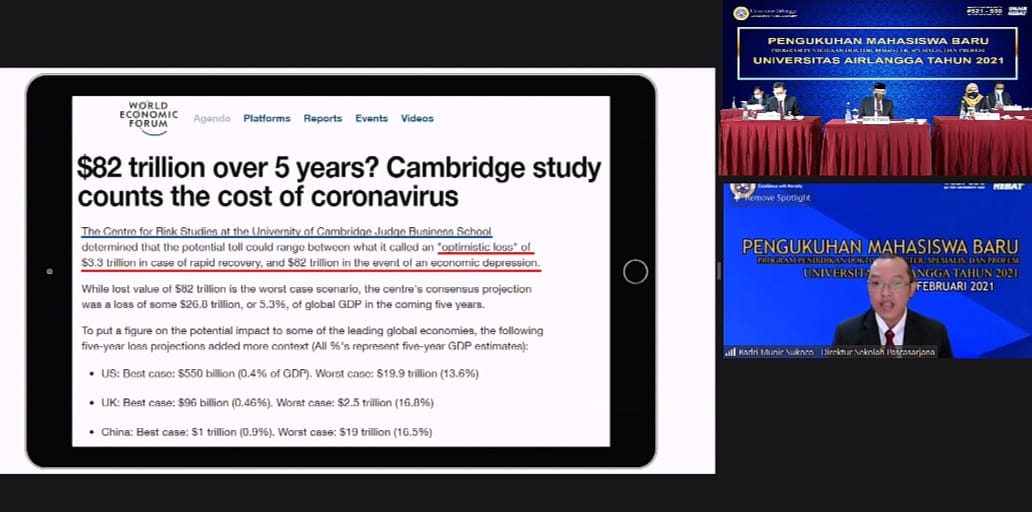UNAIR NEWS – Inauguration of New Students for Doctoral, Master’s, Specialist, and Professional Programs held virtually, was attended directly by Rector and leadership ranks together with 925 new students on Wednesday, February 17. In this sacred procession, Prof. Badri Munir Sukoco, Ph.D., as the Postgraduate School Director, delivered a scientific oration entitled “Start-up and Transformation of Indonesian Economic”.
In the opening, Prof. Badri discussed Indonesia’s potential. According to him, many experts and media in the international news highlight Indonesia’s economy will become a world power. Indonesia has many potentials, from the number of human resources to the potential use of smartphones that all Indonesian young people can almost access.
“This is the vision of Advanced Indonesia cabinet. It is expected that in 2045 Indonesia will become a developed country, and this will be realized in the mission of economic transformation,” he explained.
The mission to achieve this economic transformation, he continued, was struck by the pandemic conditions that had shaken the world economy. However, even though a pandemic is hitting the economy, some people have experienced significant economic improvements. The people who share that financial improvement are mostly people who are engaged in technology.
Apply “Creative Class”
In the next presentation, Prof. Badri reviews the urgency of a “creative class,” a concept developed by Richard Florida that proposes a new way to understand the machines that drive wealth creation. According to him, the existence of a “creative class” can boost a country’s GDP.
“Therefore, this is a moment for postgraduate students to develop a ‘creative class.’ Even some experts have observed that if around 20% percent of Indonesia applies a “creative class,” then Indonesia can get out of the middle to lower economic class, “he explained.
After emphasizing the urgency of “creative class,” Prof. Badri continued his presentation on China’s economic progress. Prof. Badri also linked China’s economic progress to the role of universities. In the “creative class”, higher education is considered capable of driving the economy with the presence of start-ups.
“Higher education is the most appropriate place to develop start-ups. Because in higher education many young smart people are selected, there is a wide space for experimentation, a place for interaction of people from various disciplines, and a wide, flexible network, as well as very complex human resource skills and competencies,“ he explained.
At the end, Prof. Badri again emphasized that “creative classes” in higher education are urgently needed. In this case, start-ups are the main actors of the “creative class” in transforming the economy and strategic industries.
“This is what postgraduate students can do and is needed to transform Indonesia’s economy both at the national and regional levels,” he concluded.
Author: Nuri Hermawan





